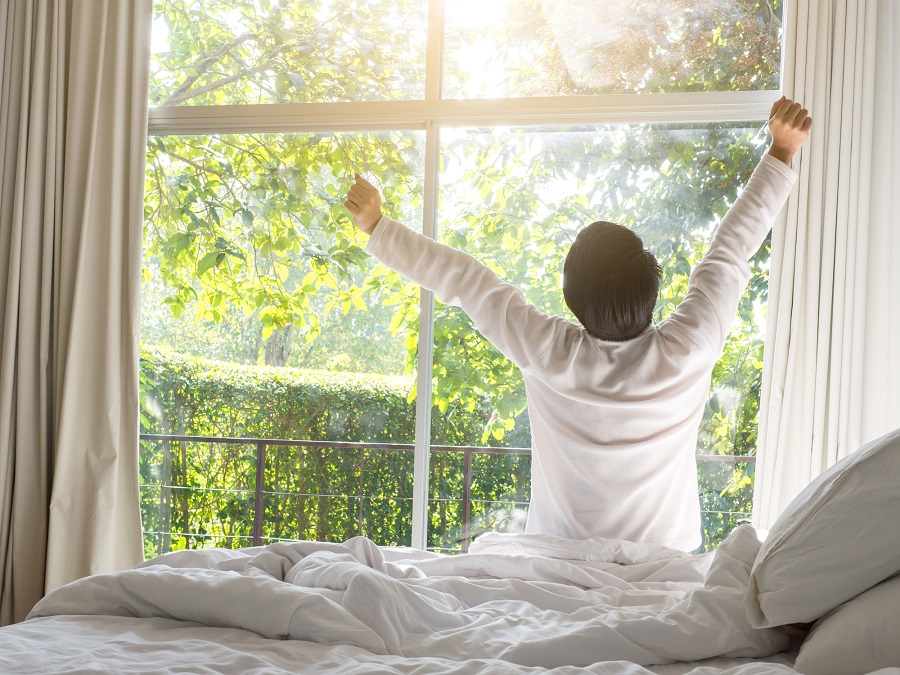Tips for Healthy Sleep Habits

Getting a healthy amount of sleep is crucial for overall wellness. When we don't get enough sleep or experience disruptions in our sleep, it can lead to daytime drowsiness, concentration problems, and increases in blood pressure, stress hormones, and weight. Quality sleep is especially important for students as the brain needs to process and retain the learning that occurs during the day. Poor sleep can also increase the risk of serious illnesses such as diabetes or heart failure. According to the National Sleep Foundation, 95% of people need 7-9 hours of sleep per night. When people are sleep deprived, defined as 5 hours or less of sleep a night, they experience psychomotor impairment equivalent to being legally drunk.
Creating Healthy Sleep Habits
A great night’s sleep starts first thing in the morning! To create the best opportunity to enjoy consistently good sleep, follow these tips:
- Aim to get 30 minutes of natural light early in your day, which promotes a healthy circadian rhythm.
- Keep your bedroom cool and dark, using light-blocking drapes if necessary. Optimal sleep occurs when the temperature is between 65-68 degrees.
- Follow a regular schedule of going to bed and getting up each day, and only vary it slightly on weekends and holidays.
- Limit screen time in the hours before bed and turn off hand-held screens one hour before you go to bed. Put your phone on Do Not Disturb so that your sleep isn’t interrupted.
- Use your bed only for sleep and sex. Working on a laptop or watching TV will create an unhelpful association in your brain that it’s okay to be awake in bed for extended periods.
- Stop consuming caffeine at least 8 hours before your bedtime and limit alcohol in the evenings, especially in the last hour before bedtime.
- Try not to eat a heavy meal in the 2-3 hours before bed.
Getting Sleep Back on Track
When you don’t get good sleep, everything else in life suffers. If you find yourself struggling to get refreshing sleep, here are some suggestions:
- If you can’t fall asleep after 20 minutes or wake up in the middle of the night and can’t fall back to sleep, don’t lay there tossing and turning. Instead, get out of bed and go elsewhere in your home where you can do some relaxing activity. Just don’t get on your phone or laptop! Keep the lights low. When you feel tired, go back to bed. This is a terrific “reset” for the brain that helps you fall asleep.
- If troubling thoughts and emotions keep you awake, consider journaling about your concerns earlier in the evening. Or if you often wake up with thoughts of things you need to do the next day, keep a notepad near the bed to jot these thoughts down.
- If you or your bed partner snores loudly or pauses in their breathing, talk to your doctor. Obstructive sleep apnea can be dangerous if left untreated, and treatment can restore your energy and vitality.
- If you have chronic sleep difficulties, seek out a therapist who is trained in Cognitive-Behavioral Therapy for Insomnia (CBT-I). This highly effective treatment can help you address the complex issues that contribute to insomnia.
Impacts of Daylight Savings Time
Daylight Saving Time was created to allow workers to experience more daylight in the evenings between March and November. In March, clocks are moved “forward” and in November they are moved “back” to Standard Time. A growing body of research notes that these shifts have impacts on our health and even our safety. The transition in spring is more impactful since people lose an hour of sleep. However, the shift in fall still has negative impacts, likely because many people stay up later since they know they will gain an extra hour overnight.
Approximately 55% of people experience tiredness following the change in March. According to the Bloomberg School of Public Health at Johns Hopkins, increases in heart attacks, strokes, suicides, mood disturbances, and hospital admissions occur with time change. Increases in motor vehicle collisions and workplace accidents have also been documented during the time of the seasonal clock change.
Our body’s circadian rhythms are largely controlled by cycles of light and darkness. Changing our clocks leads to a misalignment between our circadian cycle and our light exposure and activities. This results in sleep difficulties and physiological changes. Most people adjust to the time change after a few days or a week, but you can ease your transition with a couple of simple changes.
- To prepare for losing an hour of sleep in spring, try setting your alarm 15 minutes earlier for several days before the change.
- Try to spend time outdoors in natural light, which will help re-orient your circadian rhythm to the new time.
References:
- Can’t Sleep? 8 Techniques You Can Do (sleepfoundation.org)
- Healthy Sleep Habits - Sleep Education by the AASM
- Healthy Sleep Habits: The Ultimate Sleep Improvement Plan (sleepfoundation.org)
- Daylight Saving Time: Everything You Need to Know (sleepfoundation.org)
- 7 Things to Know About Daylight Saving Time | Johns Hopkins | Bloomberg School of Public Health (jhu.edu)